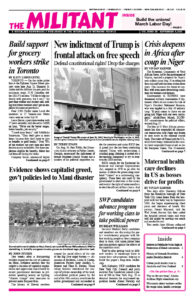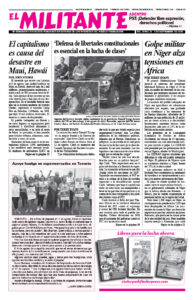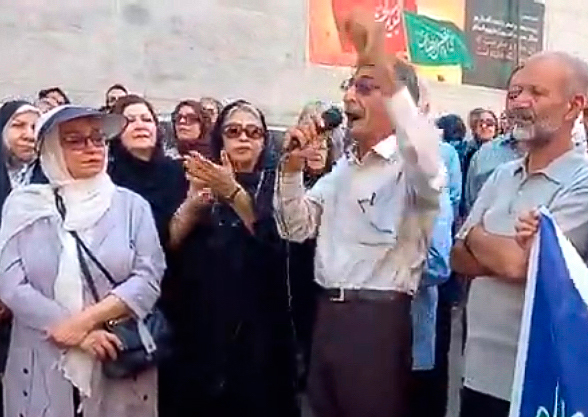The bourgeois clerical regime in Tehran has launched new moves against working people and its political opponents, hoping to head off protests on the one-year anniversary of the death of Zhina Amini. The 22-year-old Kurdish woman died Sept. 16, 2022, after her arrest by the hated “morality police” for not heeding the mandatory dress code.
Over the next several months hundreds of thousands took to the streets to protest across the country. The regime’s thugs and police killed more than 500 people.
Family members of those killed in the earlier protests are being warned that public remembrances will not be tolerated. On Aug. 16 a dozen women’s rights and political activists were arrested in Gilan province, charged with planning to incite “chaos and vandalism,” and with working for foreign spy agencies, including Israel’s.
The anniversary of Amini’s death is five days before schools reopen. Authorities have been summoning students and warning them not to protest.
After Amini’s death the regime pulled the “morality police” off the streets. But after the protests died down in the face of repression it has tried to reimpose its reactionary laws. This includes closing some businesses for serving women who enter without “proper” hijab. But thousands of women are ignoring the decrees.
Divisions in the capitalist class
A proposed new “Hijab and Chastity” law would require police to first issue warnings then successively higher fines and confiscation of vehicles for repeat offenders. One sign of the divisions in the ruling class has been debate over the proposal, with parliament voting that it would be held privately.
Sayyed Ghani Nazari, a member of Parliament from Ardabil province, which is mostly Azerbaijani, voted against a secret debate. “The government’s priority should be the economy,” he told Asr Iran news site. If the police enforce hijab laws “it will not have enough people to deal with theft and smuggling.”
MP Ahmad Alireza Begi told reformist daily Shargh that the bill will end up like the “Satellite Law,” which banned satellite dishes to block foreign news and cultural influences. Despite the destruction of more than 100,000 dishes, millions continue to flaunt the law and cops usually look the other way.
Conservative daily Farhikhtegan wrote that since the hijab was reimposed by law in 1983, “citizens had reached a kind of peaceful coexistence with each other.” It warns against taking a hardline now.
In fact, there has been a noticeable change in the attitude of workers, farmers and the middle class toward the counterrevolutionary capitalist government. Confidence has grown among workers that they can win support for their demands.
Amid over 30% annual inflation, gas shortages and speedup on the job, there is a modest uptick in protests: retired workers demanding adequate pensions and health care; workers demanding unpaid earnings, wages to match inflation and opposing attempts to raise the retirement age; farmers protesting lack of water and low prices for their produce; teachers demanding the release of imprisoned unionists and more.
Even Alireza Mahjoub, secretary general of the government-funded Workers House, has had to speak out against the worsening conditions and called for respecting the constitutional rights to assembly and free speech. “These freedoms must be protected,” he told the Iranian Labor News Agency, noting that the police have interfered when “retirees gather in front of parliament to make their voices heard.”
Fight for democratic rights
In Zahedan, in the Baluchistan region, a weekly Friday march resumed Aug. 18, after a several week hiatus, demanding freedom for political prisoners. Thousands had marched there for at least 41 consecutive weeks after the regime’s thugs killed 60 people outside the mosque.
Week after week Sunni cleric Maulana Abdul Hamid has put forward demands for basic democratic rights. He has spoken out against discrimination against ethnic and religious minorities, including Sunnis, who are excluded from many government positions. He has denounced the persecution of people of the Baha’i faith and calls for equal rights for women.
In his Aug. 18 speech, he said that members of Parliament should not be the representatives of the “system” but should “defend the people’s rights,” including on questions of “foreign policy.” That’s a reference to the Shiite-based regime’s increasingly unpopular military adventures in Lebanon, Syria, Iraq and beyond, as it seeks to extend its counterrevolutionary power in the region.
Abdul Hamid again called for release of the thousands of political prisoners and denounced the attacks on peaceful protesters.
“We hate the evils and oppression of America, Europe and Israel, but why not take their good things?” he asked. He noted that in Israel there were huge protests against Prime Minister Benjamin Netanyahu’s plans to “reform” the judiciary. The “surprising” thing, he said, was that unlike in Iran “no one was killed. Israeli forces kill Palestinians, but they do not kill their own people.”
Two days later, Fathi Mohammad Naqshbandi, the Friday Iman in Rask, Baluchistan, was arrested for criticizing the government. Abdul Hamid and protests across the province called for his release.
Abdul Hamid’s speeches and the Baluch struggle have had an impact well beyond the Sunni minorities. In early July some 15 Shiite academic and cultural figures — some living in Iran and some outside the country — issued a statement “in support of Maulani Abdul Hamid and the oppressed Sunnis of Iran.”
The statement noted that Kurds and Baluchis “have suffered oppression and discrimination more than anyone else.” They note that Abdul Hamid’s sermons are “not limited to Sunni religious people. … These demands are the demands of the Iranian nation with every ethnic, linguistic and religious orientation.”


